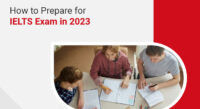
IELTS stands for the International English Language Testing System which is designed in a way to effectively assess the test-taker’s proficiency in English. The test is conducted by the British Council, IDP, and Cambridge. Assessment is done for English in both the IELTS test formats, the General Training and Academic. Students can now retake only 1 section of the IELTS exam if they did not achieve the desired score on the first attempt.
IELTS Exam Pattern 2024
The total duration of the IELTS exam is 2 hours and 45 minutes and is divided into four sections. Listening, Reading, Writing, and Speaking are the four sections of the IELTS exam pattern that are used to evaluate candidates. While the reading, writing, and listening sections will be conducted in a single day, the speaking section may be conducted on the same day or within seven days before or after the test day.
IELTS Academic and IELTS General Training Test are two different versions of the IELTS exam. Candidates should review the requirements of the college or university to which they are applying and prepare accordingly. IELTS Academic is accepted by universities all around the world where students apply for undergraduate and postgraduate courses. Always check the IELTS test pattern before preparing for the IELTS Exam.
The IELTS General Training is taken by people who want to move to a major English-speaking nation. It can also be given by individuals who are moving for work-related training in another nation. The IELTS Test Score is an important element in the selection process. More than 10,000 educational institutions in more than 150 countries recognize this exam.
IELTS question pattern is summed up in the table mentioned below:
| Sections with Duration | IELTS Academic Paper Pattern | Total Questions |
| Listening | It encompasses four recorded monologues and conversations | 40 |
| Reading | Three long reading passages with tasks
Texts range from descriptive and factual to discursive, and analytical includes non-verbal material like diagrams, graphs, and illustrations texts are authentic (taken from books, journals, and newspapers) |
40 |
| Writing | A writing task of at least 150 words where the candidate must summarize, describe or explain table, graph, chart, or diagram, and another short essay task of at least 250 words | 2 |
| Speaking | The face-to-face interview includes short questions, speaking at length about a familiar topic, and a structured discussion | 3 |
IELTS Exam Scoring Mechanism
The IELTS uses a 9-band scale to clearly define a candidate’s English proficiency levels. For each test component – listening, reading, writing, and speaking – a score will be assigned first. After that, the individual ratings will be averaged and rounded off to arrive at an Overall Band Score (OBS).
| Band Score | Skill Level | Description |
| 9 | Expert user | Has fully operational command of the language: appropriate, accurate, and fluent with complete understanding. |
| 8 | Perfect user | Has fully operational command of the language with only occasional unsystematic inaccuracies and inappropriacy. Misunderstandings may occur in unfamiliar situations. Handles complex detailed argumentation well. |
| 7 | Good user | Has operational command of the language, though with occasional inaccuracies, inappropriacy, and misunderstandings in some situations. Generally handles complex language well and understands detailed reasoning. |
| 6 | Competent user | Has generally effective command of the language despite some inaccuracies, inappropriacy, and misunderstandings. Can use and understand fairly complex language, particularly in familiar situations. |
| 5 | Modest user | Has partial command of the language, coping with overall meaning in most situations, though is likely to make many mistakes. Should be able to handle basic communication in own field. |
| 4 | Limited user | Basic competence is limited to familiar situations. Has frequent problems with understanding and expression. Is not able to use complex language. |
| 3 | Extremely limited user | Conveys and understands only general meaning in very familiar situations. Frequent breakdowns in communication occur. |
| 2 | Intermittent user | No real communication is possible except for the most basic information using isolated words or short formulae in familiar situations and to meet immediate needs. Has great difficulty understanding spoken and written English. |
| 1 | Non-user | Essentially has no ability to use the language beyond possibly a few isolated words. |
| 0 | Did not attempt test | No accessible information provided. |
Are You Planning to Prepare for the IELTS Exam?
Click Here to Book Your Free 1-On-1 Session with Experts
Overview of Each Section in IELTS Exam
IELTS Reading
- The IELTS reading test has 40 questions divided into 3 parts. Each section has a single text and a set of questions. Each section should take about 20 minutes to complete.
- The testing format is different for Academic and General Training.
- Three passages with 13-14 questions each are designed to check your ability to grasp the main idea, understand the gist, and put forth a logical argument in the passage.
- Question types may be multiple-choice, sentence completion, summary writing, matching information, or short-answers based on the given passages
- The Academic format comprises of three long texts which may be descriptive and factual or discursive and analytical taken from books, journals, magazines, or newspapers and are more academic in context.
- The General Training format comprises extracts from books, magazines, newspapers, notices, or advertisements, which are more general in the context
- Band score scales from 0 to 9.
IELTS Reading Question Types
IELTS reading question pattern:
- Multiple choice
- Identifying information
- Identifying the writer’s views/claims
- Matching information
- Matching headings
- Matching features
- Matching sentence endings
- Sentence completion
- Summary, note, table, flow-chart completion
- Diagram label completion
- Short-answer questions
IELTS Academic Reading
There are 40 questions in the IELTS Academic Reading Section, which are based on three different reading paragraphs. The IELTS Academic Reading section is of 60 minutes and includes questions such as multiple choice, identifying information, matching information, matching headings, matching sentence endings, matching features, sentence completion, summary completion, flow chart, diagram labeling, and so on.
IELTS General Training Reading
Extracts from books, magazines, newspapers, notices, advertisements, company handbooks, and guidelines are included in the IELTS pattern’s General Training Reading paper. In an English-speaking environment, you are likely to come across these things on a daily basis.
There are 3 sections.
- Section 1 may comprise two or three short texts or several shorter texts.
- Section 2 comprises two texts.
- Section 3 comprises one long text.
IELTS Writing
The IELTS Writing test lasts 60 minutes, and you’ll have to complete two writing assignments, each with a different form of text (description, report, discussion, argument, opinion text).
- The testing format is different for Academic and General Training.
- Tasks in the Academic format:
– Task 1: A graph, table, chart, stages of a process, or a diagram is given and test-takers are required to describe or summarize the information provided to them.
– Task 2: Test-takers are required to write a formal and academic-style essay expressing their point of view in response to the given argument or problem and support their response with appropriate examples. - Tasks in the General Training format:
– Task 1: Test-takers are required to write a personal, semi-formal, or formal style letter requesting certain information or explaining a given situation.
– Task 2: Test-takers are required to write a personal-style essay expressing their opinion of a particular argument or problem and support their response with appropriate examples. - Band Score scales from 0 to 9
IELTS Writing Question Types
- Give general factual information about the topic.
- Describe the root causes of a problem.
- Explain why a problem exists.
- Provide solutions to a problem.
- Consider evidence and ideas.
- Justify your point of view.
- Determine whether there are more benefits or drawbacks.
IELTS Academic Writing
Topics are of general interest to aspirants interested in pursuing undergraduate and postgraduate courses, as well as professional registration.
IELTS General Training Writing
The topics are interesting to a wide range of people. The situations you’ll be writing about are common and everyday ones.
IELTS Listening
The IELTS listening test is the same for both those taking the Academic and General Training papers. The listening test is divided into four sections, each of which is more difficult than the last. To put it another way, part one is the simplest, and part four is the hardest. Each section has a unique theme or emphasis.
- Duration of 30 minutes
- Four tasks with a total of 40 questions designed to test your ability to understand the main ideas and identify information that is required
- The four listening items are:
– a conversation between two individuals in an everyday social context
– a monologue or a speech
– a conversation between two or among four people in an academic setting
– a monologue on an academic subject, in other words, a lecture - Each recording is played only once and test-takers are allowed to take down notes while listening and refer to them while answering the questions
- Band score scales from 0 to 9
IELTS Listening Question Types
IELTS listening question pattern:
- Multiple choice
- Matching
- Plan, map, diagram labeling
- Form, note, table, flowchart, summary completion
- Sentence completion
- Short-answer questions
IELTS Academic Listening
It assesses your ability to comprehend the main ideas, detailed information, opinions, purpose, and attitudes of the speakers, as well as your ability to track the progression of ideas.
IELTS General Training Listening
The General Training Listening test will evaluate your ability to understand the speakers’ main ideas, detailed information, opinions, purpose, and attitudes, as well as your ability to follow the development of ideas.
IELTS Speaking
The IELTS Speaking test is a part of the IELTS exam that tests your English speaking skills, specifically how well you can express yourself, talk about things, and make arguments to support your position. The test is usually conducted on a different day, either after or before the Writing, Reading, and Listening exams, which are all conducted on the same day.
- The IELTS test format is the same for Academic and General Training.
- Three sections for a total duration of 11-14 minutes
- The test is recorded for evaluation purposes and will be a face-to-face interview with an examiner who assesses your ability to speak English
- Part 1:
– Examiner asks general questions about the test-taker
– Proceeds with asking about familiar things like home, family, work, studies, and interests
– This session lasts for about four to five minutes - Part 2:
– The test-taker is given a task card with the prompts.
– Test-taker is given a minute to prepare his speech
– Test-taker is asked to deliver a two-minute speech on the topic mentioned on the task card - Part 3:
– Examiner will ask more questions based on the response given by the test-taker in the second part, potentially exploring perspectives on international education and study abroad opportunities.
– Test-taker gets an opportunity to discuss more abstract ideas and issues
– Lasts for about four to five minutes - Band scores scale from 0 to 9
IELTS Speaking Question Types
- Part 1: Introduction and questions on well-known subjects.
- Part 2: Individual long turn.
- Part 3: A two-way conversation.
IELTS Academic Speaking
The IELTS Academic Speaking test will assess your ability to communicate in English. It is given in person with a trained IELTS examiner, and all Speaking tests are recorded. The Academic Speaking test consists of three parts and lasts between 11 and 15 minutes.
IELTS General Training Speaking
The IELTS General Training Speaking test will evaluate your ability to communicate in English. All speaking tests are given in front of a certified IELTS examiner and are videotaped in case they need to be reviewed. The General Training Speaking test lasts between 11 and 14 minutes and is divided into three parts.
Are You Planning to Study Abroad?
Click Here to Book Your Free 1-On-1 Session with Experts
IELTS Exam Pattern 2024: Essential Tricks to Success
Reading
- Practice skimming and scanning information – you’ll need to be able to do both. Reading to get a general idea of the content provided is known as skimming. You don’t have to if you understand the passage. It’s just a matter of getting a feel for the subject and layout. Attempt to underline/highlight any keywords that come to mind at the same time.
- You should be able to recognize keywords. You must also understand how to properly employ them. Each question will include keywords to assist you in locating information from the passage and determining the correct answer.
- Develop skills for each of the 11 questions. Make a plan to deal with each one. It is said that practice makes perfect. Most people have trouble with “True False Not Given (TFNG)” answers. Make more time to type TFNG.
- Practice reading to get a gist of what you’re reading and to improve your speed in locating information.
- Practice mock tests in a non-exam setting to improve your skills.
- Prepare for exams by taking practice tests under exam conditions. This will allow you to assess your performance and track your progress.
- Practice reading for main ideas and logical arguments, but don’t try and understand the entire passage – there is a strict time limit for this section. Your ability to answer questions in a timely manner will be severely tested. You must improve your reading speed. To find information, quickly scan a passage. Most questions are designed to test your ability to locate specific information, so reading the entire content is not recommended. “Matching Headings” and “Choosing a Title” are the only two types of questions that require a thorough understanding. The remaining questions do not. The rest is based on information about where to find things.
Writing
- Learn how to find synonyms quickly and easily.
- Make a list of topics that you are familiar with and practice writing about them.
- For each topic, express an opinion or a preference, and then back it up with evidence.
- Plan and write at least one essay on each of the topics.
- To create a structure for your response, use signal words and phrases like “on the one hand,” “in conclusion,” and “on the other hand.”
- Learn grammatical structures to the point where you can use them naturally in your writing.
- Learn the rules of grammar, punctuation, and layout (e.g. paragraph styling)
- Read articles with a word count of 300-400 words. Make outlines of the articles’ major points and essential details.
- Make a summary of the information presented in the articles using these outlines.
- Make summaries brief so that only the most important points are conveyed.
- Make sure to use different words and grammatical structures when paraphrasing. Paraphrasing is the process of rephrasing something from another source into your own words.
Listening
- Develop your vocabulary – this is one of the most important factors that affect your IELTS score. It’s not just about memorizing word meanings. It’s also important to understand when to use and when not to use the same word. While practicing, you should make word lists and choose from them.
- While you’re listening, make an outline of the information you’ve heard. Write down the main points, important details, and main ideas.
- Cause/effect, compare/contrast, and steps in a process are all examples of relationships between ideas.
- Prepare yourself for what someone is going to say (as a way to stay focused).
- Listen to recorded material and pause it at different points to process what you’ve heard. Predict the next piece of information or idea to be shared.
- Try to figure out whether a speech/conversation is intended to be an apology, a complaint, or a suggestion.
- Take note of whether the language of narration used in various recordings is formal or informal.
- Pay attention to the tone and volume of the speaker’s voice and to how stress or intonation patterns are used to convey meaning.
Speaking
- On the Internet, in books, or anywhere else, find listening and reading materials on a single topic. These materials may present similar or divergent points of view. Take notes on both the written and spoken portions of the presentation.
- Make a summary of the information and ideas.
- Make a summary of the information and determine how the written and spoken parts are related.
- Explain how the ideas are related, how one expands on the other, or how some ideas contradict one another.






















